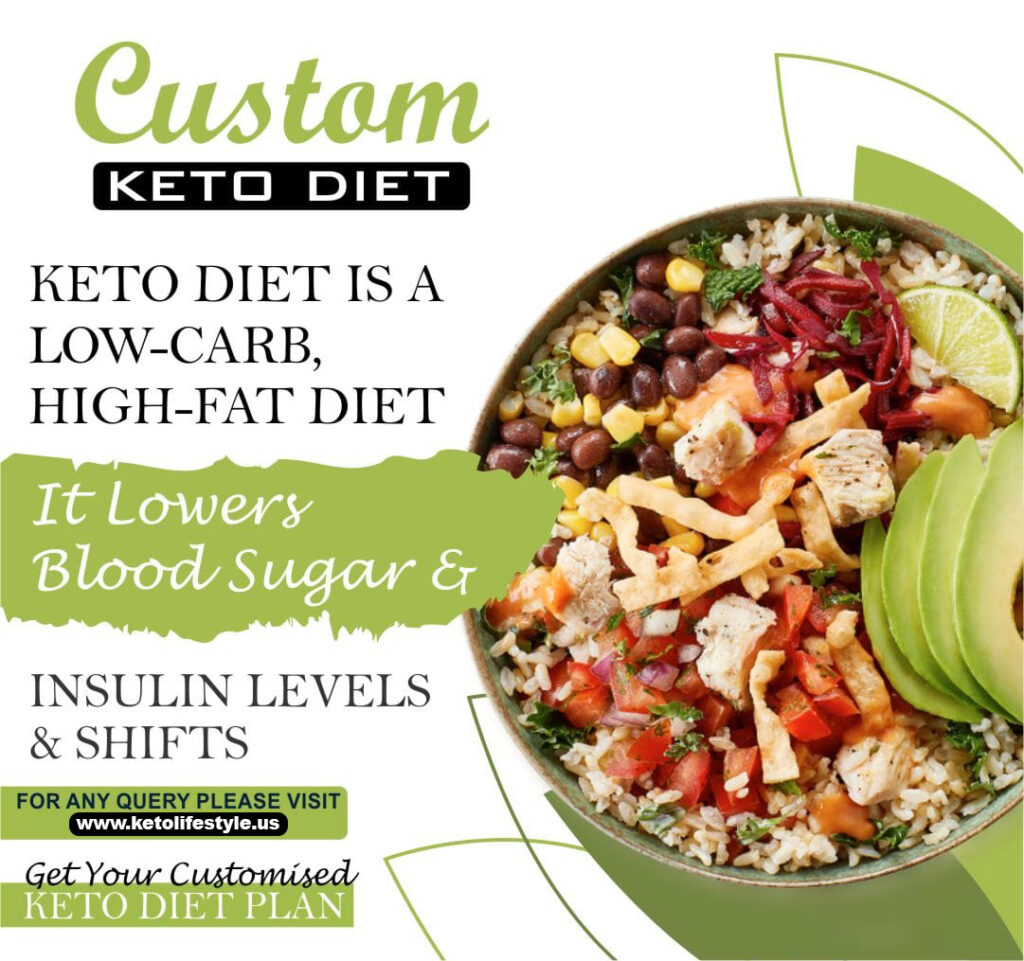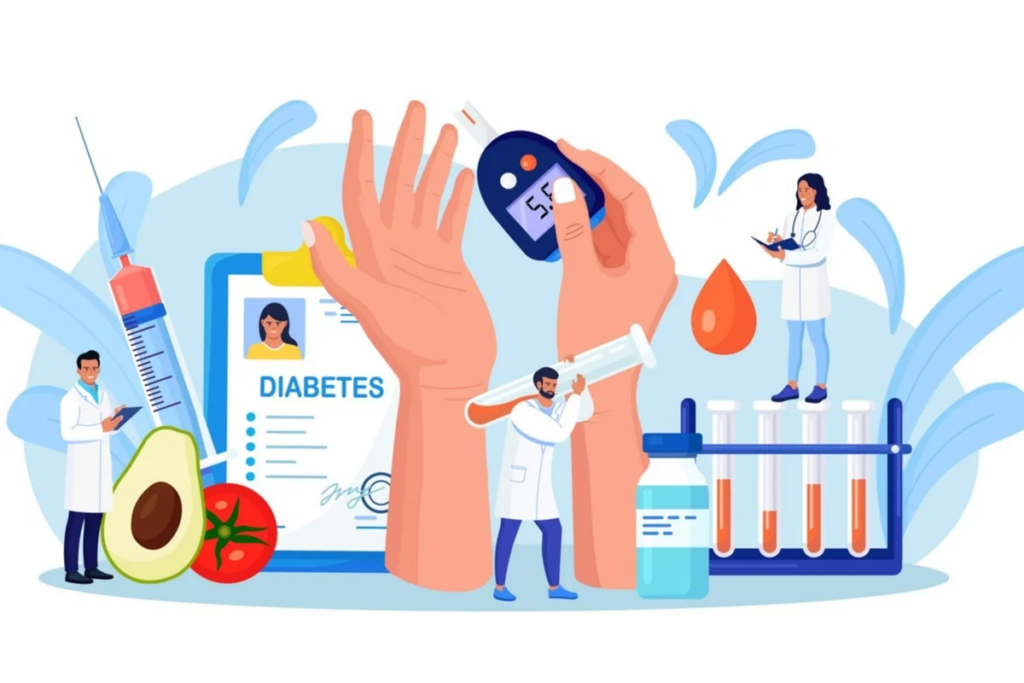Ketogenic Diet for Diabetes: The ketogenic diet has become increasingly popular in recent years, with celebrities and social media influencers touting its benefits for weight loss and overall health. But is keto safe and effective for people with diabetes? Let’s take a closer look at how the diet works, its potential benefits and risks, and tips for getting started.
What is the Ketogenic Diet?

The ketogenic or “keto” diet is a very low-carbohydrate, high-fat diet that forces the body to burn fats rather than carbohydrates for energy. This metabolic state is called ketosis. On the keto diet, carb intake is typically reduced to less than 50 grams per day. To put this in perspective, one turkey sandwich can contain around 45 grams of carbs from the bread alone. By severely limiting carbs, the keto diet causes blood sugar and insulin levels to decrease significantly. This transition to using ketone bodies instead of glucose for fuel is why the diet is called “ketogenic.”
Some of the foods restricted on keto include grains, starchy vegetables, fruit, beans, and sugary foods. Foods emphasized include meat, fish, eggs, nuts, seeds, high-fat dairy, and non-starchy vegetables like leafy greens. Fats should make up around 70% of total daily calories. These are healthy unsaturated fats like olive oil, avocado, and fatty fish – not saturated fats. Strict carb counting and monitoring of ketone levels is required to stay in ketosis.
Keto Diet Plan For Beginners: Step By Step Guide
The complete ketogenic diet guide for beginners. Learn what keto is, how it works, keto meal plans, foods to eat and avoid, side effects, macros calculator, intermittent fasting tips, and everything else you need to know to get started.


Guide to the best Vegan and KETO meal plans, cookbooks, and challenges you can find online to help you with your new healthy diet. Easy step by step guides, custom keto diet plans, starter kits and more for beginners. Healthy KETO meal plans for weight loss…

Ketogenic Diet for Diabetes Management
Potential Benefits of Keto for Type 2 Diabetes

Several studies suggest the ketogenic diet may offer benefits for those with type 2 diabetes:
- Weight Loss – The high protein and fat keeps hunger at bay, which can promote weight loss. Losing just 5-10% body weight can significantly improve diabetes control. Keto diets typically lead to equal weight loss as traditional diets when calories are matched.
- Improved Blood Sugar – Lowering carb intake frequently improves blood sugar levels and HbA1c in people with diabetes. Some achieve diabetes remission by normalizing blood sugars without meds.
- Reduced Medications – The diet’s dramatic impact on blood sugar may allow some diabetics to reduce dosages of insulin and other glucose-lowering meds.
- Increased Energy – The steady fuel supply from high fat intake can increase and stabilize energy levels.
- Improved Cholesterol – Keto diets may increase “good” HDL cholesterol while lowering triglycerides. But LDL may also increase, raising cardiac risks.
Risks and Concerns with Keto for Diabetes
Despite potential benefits, the keto diet carries notable health risks:
- Nutrient Deficiencies – Severely restricting carb-rich foods can lead to deficiencies in vitamins, minerals, and fiber over time.
- Increased LDL Cholesterol – Some studies show keto diets raise “bad” LDL cholesterol, increasing risks of heart disease.
- Other Health Conditions – There are concerns keto may raise risks for certain cancers, Alzheimer’s, kidney stones, and fatty liver.
- Hypoglycemia – Low carb intake can rapidly lower blood sugars. If diabetes medication dosages aren’t adjusted, hypoglycemia can result.
- Ketoacidosis (DKA) – Ketone buildup can trigger this dangerous complication, especially for those with type 1 diabetes.
- Yo-Yo Dieting – Going on and off the diet repeatedly stresses the heart and metabolism. Sustained weight loss becomes unlikely.
- Disordered Eating – The diet’s strict rules increase risks for binge eating, orthorexia, and other eating disorders.
Is Keto Recommended for Type 1 Diabetes?
There are heightened risks and limitations for those with type 1 diabetes pursuing the keto diet. Reduced carb intake lowers insulin requirements, but this must be balanced properly with adjustments in insulin dosage. The risk of low blood sugar and ketoacidosis also increases substantially. For these reasons, most experts advise type 1 diabetics to avoid very low carb diets due to safety concerns.
Is Keto Recommended for Type 2 Diabetes?
Opinions are mixed on whether keto diets are advisable for those with type 2 diabetes. Some major health organizations like the American Diabetes Association do not recommend very low carb diets due to associated risks. However, an increasing number of type 2 diabetics are pursuing the diet under medical supervision and seeing positive results. Overall, more research is still needed on the long-term safety and efficacy of keto diets for type 2 diabetes management.

Tips for Starting Keto with Diabetes
If you have type 2 diabetes and are interested in trying the keto diet, here are some tips to do it safely:
- Talk to Your Doctor First – Get medical guidance and monitoring, especially if you use insulin or other diabetes medications.
- Work with a Registered Dietitian – An RDN can help plan balanced, nutritious keto meals and ensure you avoid deficiencies.
- Make Changes Slowly – Lower carbs gradually over weeks, not all at once. This prevents complications from sudden blood sugar drops.
- Check Ketones and Blood Sugar – Monitor both regularly to prevent ketoacidosis and hypoglycemia. High ketones or unexplained hyperglycemia require urgent medical attention.
- Adjust Medications – Work with your doctor to lower diabetes meds as needed to prevent hypoglycemia as carbs and blood sugar decrease.
- Include Keto-Friendly Fiber – Non-starchy vegetables, avocado, nuts, and seeds will provide fiber and nutrients.
- Focus on Healthy Fats – Seek fats high in monounsaturates and omega-3s (olive oil, avocado, salmon). Limit saturated fats.
- Drink Plenty of Fluids – Dehydration and electrolyte imbalances can occur. Consume bouillon, mineral water, or electrolyte supplements.
- Be Active – Exercise provides cardiovascular benefits and helps sustain weight loss and diabetes remission.
- Avoid Rigid Thinking – No food is completely off limits. Make room for an occasional small treat without guilt.
- Seek Support – Consider joining a clinic or online keto program for people with diabetes to help ensure success.
Frequently Asked Questions (FAQs)
What is the ketogenic diet?
The ketogenic or “keto” diet is a very low-carbohydrate, high-fat diet that forces the body to burn fats rather than carbs for fuel. This creates ketones and a metabolic state called ketosis. Keto typically limits carbs to under 50 grams per day.
How does keto help manage diabetes?
By restricting carbs, keto diets can lower blood sugar and insulin levels. This may improve HbA1c, enhance weight loss, reduce need for diabetes medication, and increase energy levels.
What are the risks of keto for diabetes?
Potential risks include nutrient deficiencies, increased LDL cholesterol, hypoglycemia, ketoacidosis, yo-yo dieting effects, and disordered eating patterns. It may also increase risk of certain health conditions.
Is keto recommended for type 1 diabetes?
No, keto is not typically recommended for type 1 diabetes due to increased risks of hypoglycemia and diabetic ketoacidosis. Very close medical monitoring is required.
Is keto recommended for type 2 diabetes?
Opinions vary on whether keto should be recommended for type 2 diabetes. While some studies show benefits, major health organizations express caution about very low-carb diets due to associated health risks.
How can you start keto safely with diabetes?
Work closely with your healthcare team, make changes slowly, monitor blood sugar and ketones, adjust diabetes meds, focus on healthy fats, stay hydrated, exercise, and seek nutrition counseling and peer support.
What does the research say about keto for diabetes?
While some studies show keto can improve A1c, weight, cholesterol, and blood sugar in type 2 diabetes, long-term safety and efficacy remains inconclusive. More rigorous research is still needed.
Is keto easy to stick to lifelong for diabetes?
No, keto is extremely restrictive and difficult to sustain lifelong for most people. Yo-yo dieting is common. Success often requires substantial medical support. Lifelong carbohydrate reduction is emphasized over keto specifically.
Does keto reverse or cure type 2 diabetes?
Some people can achieve diabetes remission and normalize blood sugar on keto without meds. But this requires very low, sustained carb intake. Diabetes reversal is often temporary once higher carbs are reintroduced.
Can you ever eat carbs again after doing keto?
Moderate carbs can often be added back into the diet after doing keto, especially carb-rich foods with fiber. But blood sugar levels need to be closely monitored for subsequent rises upon increasing carbs.
The Bottom Line
The ketogenic diet holds promise for improving blood sugar control, aiding weight loss, and potentially reversing type 2 diabetes. However, the diet is extremely restrictive and difficult to sustain long term. There are also notable health risks that must be considered. Consulting your diabetes healthcare team and pursuing the diet under medical supervision is highly advised. While keto may not be right for everyone with diabetes, those who monitor the diet carefully and make approved adjustments to medication may achieve excellent results. With thorough education and support, the keto diet can be a safe and effective option for some adults seeking improved diabetes management. But it requires commitment, preparation, and vigilant medical oversight.






It’s like you read my mind! You appear to know so much about this, like you wrote the book on it or something. I think that you can do with a few pics to drive the message home a little bit, but other than that, this is a fantastic blog. A great read. I’ll certainly be back.
Thank you so much for your kind words! I’m thrilled to hear that you enjoyed the blog post. Your feedback truly means a lot to me. Adding some visuals is a fantastic suggestion, and I’ll definitely consider incorporating more images to enhance the message. I appreciate your support and look forward to having you back for more reads. If there are any specific topics you’d like me to cover in the future, feel free to let me know. Happy reading!
[…] Complete Guide to the Ketogenic Diet for Diabetes Management […]
[…] Complete Guide to the Ketogenic Diet for Diabetes Management […]